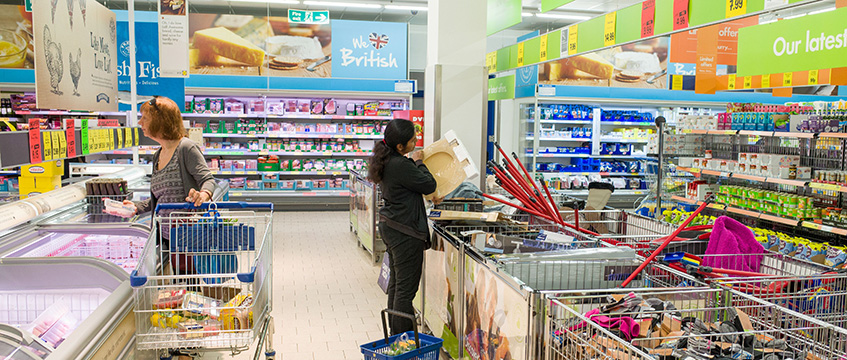Everyone knows it is a dog-eat-dog world in Britain’s supermarket sector, writes Deirdre Hipwell.
It is an industry that generally has far more retail space than it needs, is under constant pricing pressure and faces a host of wider challenges, from higher business rates to inflation, that are beyond its control.
Britain’s “Big Four” grocers – Tesco, Sainsbury’s, Asda and Morrisons – are also fighting a food price war with German discounters Aldi and Lidl. Both discounters have been in the UK for years, but it is only in the past decade that they have made strides in stealing market share from their bigger rivals. Together they now have more than 10% of the UK market and many expect that could reach at least 20% in the coming years.
Lidl is the discounter to really keep an eye on this year. According to Kantar Worldpanel, it has regained its title of fastest-growing supermarket from its arch rival Aldi, at least for now, and it also has a new UK boss in the shape of 34-year-old Christian Härtnagel, who is likely to try and shake things up in the sector.
Härtnagel’s appointment was one a number of senior management changes that Lidl has made recently. He replaced Ronny Gottschlich, a seeming star and former chief executive of Lidl UK, who left abruptly amid rumours of disagreements with the top management in Germany. Gottschlich was quickly followed by Sven Seidel, the overall Lidl group chief executive, who left after crossing swords with Schwarz, the chain’s owner.
Sitting in London it can often be hard to work out the goings on of a secretive German corporation, but it is pretty clear that Lidl UK is in for some changes.
Härtnagel has been at Lidl for 14 years, where he worked his way up from customer assistant to head of Lidl Austria. He also worked for a number of years in Ireland, and has a particular skill-set in logistics, distribution and operations. The core DNA of being a discount grocer is low-cost operations and the key to that is a streamlined distribution network.
Whether through oversight of the previous management or just the difficulties of securing planning and sites in the UK, it would seem that Lidl has been slower in opening new warehouses to support its store expansion programme than it should have been. Rising distribution costs can weigh on the bottom line, so expect to see Lidl increasing the pace of new warehouse openings to support the growing sales in stores.
Last month Lidl opened its 436,000 sq ft regional distribution centre in Wednesbury, West Midlands, which is its eleventh in the UK. The opening of the centre – which will initially service 56 stores – forms part of the grocer’s planned £1.5bn expansion between 2015 and 2018.
Further warehouses are planned in Exeter, Doncaster and Bolton, and Lidl has also been given the green light to relocate and expand its Scottish regional distribution centre to Eurocentral.
Härtnagel has also moved quickly to change the top management team in the UK. He recently appointed Tim Ulbrich and Robert Ryan as operations board directors, who will share responsibility for store operations and logistics along with Matt Heslop, who is chief operating officer at Lidl. Nan Gibson has also joined as HR director from Virgin Atlantic.
Härtnagel is unlikely to ease off on Lidl’s store expansion plans either. The group currently has 650 stores and is targeting another 50 this year. Its ultimate aim is to have 1,500 stores in the UK. Store refurbishments of its existing estate are also under way to ensure Lidl’s older estate doesn’t fall behind its newer stores.
Some in the market have speculated that the fancier lighting and flooring at the new stores were too far a departure from its discounter model for its German parent to stomach, but it is not expected there will be any significant departure from that strategy.
Life is still relatively rosy for the discounters in general, but it is getting tougher. Opening more stores so rapidly means a sacrifice of like-for-like sales and it is clear that profit margins for the discounters today are much lower than a couple of years ago.
They are also have to be on their guard for the fight back from the Big Four, particularly a recovering Tesco and Morrisons.
Having met Härtnagel, who only learned English fairly recently and has only been based in the UK for about seven months, he seems more than up for the challenge. It should be an interesting few years to watch.
Deirdre Hipwell is retail and M&A editor at The Times











